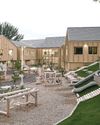
ONE MORNING when I was eight years old, my Grade 3 teacher cut math class short and brought us all to the conference room of the small school I attended in Abram-Village, Prince Edward Island. There, a social worker stood in front of the small student body-about 120 kids-and announced that a new family was coming to our village. The Mazarabakizas were a family of refugees from Burundi who'd fled their home due to civil war. Their four eldest children would attend our school, and the social worker implored us to treat them as we would any other friends-regardless of their cultural background and differences.
If it seems a little extreme to have a full-school intervention on behalf of a single immigrant family, it was warranted in P.E.I. in 2003. Until the Mazarabakiza family arrived, I was the most foreign person in my class (my father is Acadian from New Brunswick). The population of our province was so homogenous that people sometimes identified each other by old family nicknames; on my mother's side, we'd been called the Joe Cannons ever since my great-great-grandfather Joe allegedly killed the last bear on the island with a cannon in the late 19th century. In my village of about 350 people, everyone was white-it is entirely possible that some of the kids I went to school with had never seen a Black person.
It wasn't just that the island lacked diversity-it was also trapped in a demographic death spiral. From my birth in 1995 to my 18th birthday, the island's population increased by only 9,000 people. Immigration was virtually non-existent, and young adults moved away in droves, driving up the median age from 34 to 43. I left for Ontario in 2017, because making a living as a journalist on P.E.I. seemed improbable at best.
This story is from the July 2024 edition of Maclean's.
Start your 7-day Magzter GOLD free trial to access thousands of curated premium stories, and 9,000+ magazines and newspapers.
Already a subscriber ? Sign In
This story is from the July 2024 edition of Maclean's.
Start your 7-day Magzter GOLD free trial to access thousands of curated premium stories, and 9,000+ magazines and newspapers.
Already a subscriber? Sign In

A Teacher's Tale
My career in Quebec ended because I chose to keep my hijab

Top Marks
InSaguenay, Quebec, Ecole de l'Etincelle embodies the school of the future

Modernize Parental Leave
Canada's birth rate is dropping, and the cost of living is partly to blame. A more supportive leave plan would make parenthood more affordable

"I spent years trying to learn English.Now I use ChatGPT."
AI isn't perfect, but it helps me write complex emails and understand Canadian culture

MY PREDICTION - The National School Food Program Will Transform Kids' Health
When students have access to nutritious food, they do better in school and life

FOOD
The exorbitant cost of food will have ripple effects on the restaurant industry and grocery stores. The good news? There's a plan to save the country's salmon supply.

MY PREDICTION - New Mortgage Rules Will Drive Up Housing Prices
Looser lending policies will encourage more people to buy homes they can't afford in the first place

HOUSING
Politicians will spar over how to tackle the housing crisis. Falling interest rates will draw young people into the real estate market. And a rude awakening is coming for homeowners renewing mortgages.

MY PREDICTION - Stuctured Literacy Will Help Level the Educational Playing Field
Canadian students have struggled to read and write. That stops this year.

EDUCATION
Quebec's classrooms will take centre stage in the secularism debate. Chatbots will help students create A-plus work, while others will grade themselves. And thousands of international students will be sent home.